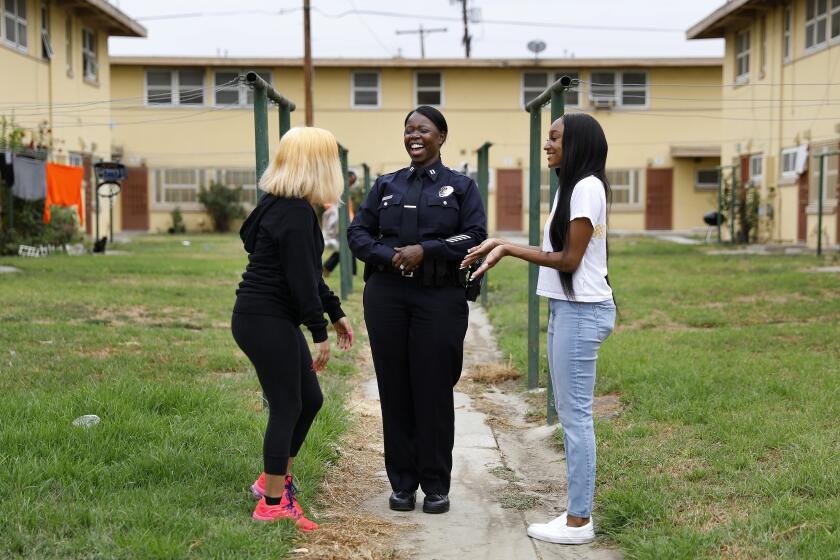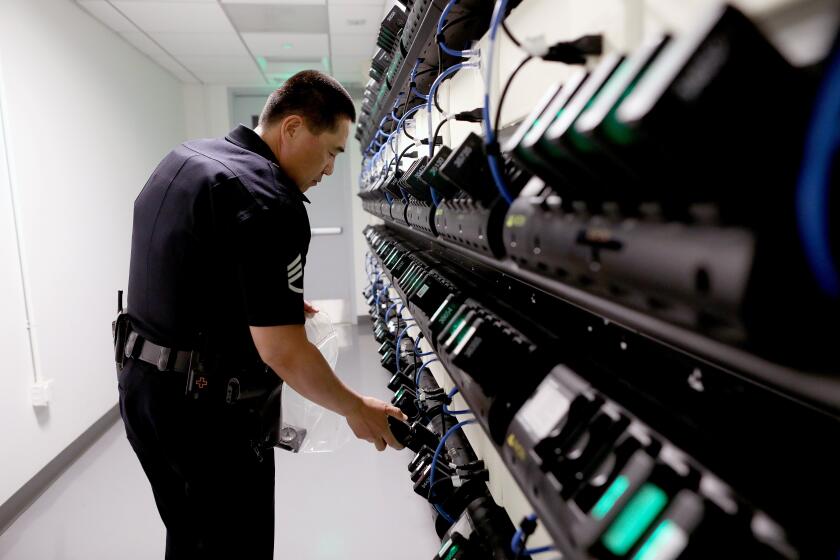Judge: LAPD officers fired over COVID vaccine dispute won’t get jobs back

- Share via
A Los Angeles police officer who was fired in 2022 after challenging the city’s COVID-19 vaccination and testing mandate is entitled to back pay but should not get her job restored, an L.A. County judge has ruled.
L.A. County Superior Court Judge Mitchell L. Beckloff said Police Department officials denied the former officer, Natalie Stringer, her right to respond to allegations prior to a disciplinary meeting, but the city did not violate labor laws and acted within its rights when she was terminated based on her “failure to comply with a valid condition of employment.”
Beckloff made similar findings in the cases of several other police officers and firefighters who were terminated over their vaccination status, the latest rebuff of challenges to the city’s coronavirus protocols.
Greg Yacoubian, a lawyer representing Stringer along with four other officers and two firefighters who sued the city over their vaccine-protocol-related firings, said he would appeal the ruling.
The case wasn’t about the vaccine, Yacoubian argued, but rather the city forcing employees to pay for COVID testing, an employer-mandated expense, and do so under a tight deadline. In moving to quickly terminate the officers, he said, the LAPD “trampled” on their due process rights.
“They were not allowed representation, they had to make these decisions really quickly,” said Yacoubian, pointing out that the city has relaxed its vaccination rules since Stringer’s firing. “If that’s allowed, they could be told to do anything down the road. And I don’t think anyone wants a police department that has that unblinking compliance.”
Los Angeles police are investigating suspects who allegedly swiped millions of dollars worth of sneakers in an elaborate scheme that stretched from a Nike distribution hub in Tennessee to a swanky Hollywood apartment building.
The city attorney’s office, which argued the case on behalf of the city and LAPD Chief Michel Moore, declined to comment, citing pending litigation. A spokesperson for LAPD also declined comment.
In the months before Stringer’s firing, the city threatened to withhold pay for noncompliant employees, mailing out notices to thousands of workers who had not provided proof of vaccination or sought exemptions. A different set of notices went out to unvaccinated employees seeking medical or religious exemptions.
At the time of Stringer’s termination, unvaccinated employees had to submit to twice-weekly coronavirus testing on their own time under the city’s vaccine rules. Each test was paid for by a $65 deduction from their paychecks, although employees granted medical or religious exemptions to being vaccinated would be reimbursed.
Thirteen LAPD employees have died of COVID-19, according to the latest department count, and there have been several long-term cases where officers have spent months at home recovering. At a Police Commission meeting last July, Moore said 150 people had left the LAPD for other law enforcement agencies without a vaccine mandate.
Despite changing attitudes about COVID-19, medical experts agree that the vaccines are safe and a major driver of progress in driving down cases worldwide of people who die or become seriously ill from the virus.
Stringer refused to submit to the testing through the city’s authorized vendor, Bluestone. Within a few weeks, she was removed from duty and later fired by Moore, despite her supervisor testifying at a board of rights hearing that he would “take her back in a heartbeat.”
Stringer moved to overturn her firing in court, arguing that her rights had been violated. The city’s vaccination conditions were illegal under the labor code, she argued, and her termination unwarranted considering her otherwise clean personnel record.
For all the gains women in the LAPD have made in recent decades, they remain underrepresented in the upper reaches of the department.
Beckloff found no basis to support Stringer’s claim that the labor code “somehow nullified the City’s condition of employment for a fully vaccinated workforce and twice weekly testing for unvaccinated employees.”
However, he found that Stringer and three of the four other officers with similar claims were entitled to back pay because the city denied her constitutional right to a Skelly hearing, a pre-disciplinary meeting during which an accused officer can respond to allegations made against them.
He said Stringer is entitled to back pay from the day she was relieved from duty, Jan. 17, 2022, to when she was fired, May 25, 2022.
Beckloff made a similar ruling in the case of another fired LAPD officer, Barbara “Bobby” Riggs, a 32-year department veteran who was working as a trainer at the police academy at the time of her termination. Even as department training went on almost as normal, Riggs said in an interview the department sought to pressure and isolate the officers who wouldn’t comply with the vaccine mandate, even those who sought exemptions for various reasons.
Officers who wouldn’t comply were sent home and threatened to have their pay withheld, she said; when the department began an internal investigation, Riggs alleged they didn’t even bother to interview her for what amounted to a “rubber-stamp complaint.” She was fired shortly afterward.
“So you make it so uncomfortable and financially burdensome so that people were either forced into compliance or they quit or retired,” Riggs said. “I could’ve retired, almost at a full pension, but somebody had to stand up and say this is wrong. And not just for me, this was for all city employees.”
In the wake of a gang unit scandal and concerns about officers misconduct, LAPD leaders are considering whether to use artificial intelligence to analyze vast troves of officer body-cam footage.
Dorit R. Reiss, a law professor at the University of San Francisco Law School, said appeals in the cases face an uphill battle because “generally employers do have quite a bit of leeway to put forward workplace requirements.”
The bar for suing governments is already high under “sovereign immunity” doctrine, Reiss said. It became even more difficult with a recent ruling by the California Court of Appeals, which found that the state university system was not required to reimburse a professor for pandemic-related work expenses, she said. In the decision, also cited by Beckloff in the Stringer case, the judges determined that government entities have the authority to set conditions of employment.
The decision, Reiss said, found that the university “has to consider its annual budget and therefore it has the right to require to pay employees for COVID testing.”
Reiss, who has studied vaccine mandates and the anti-vaccine movement nationwide, said that while California has broader protections than most states against employers seeking to fire workers with exemptions for religious or other reasons, “that doesn’t mean they can allow them to come to work.”
More to Read
Sign up for Essential California
The most important California stories and recommendations in your inbox every morning.
You may occasionally receive promotional content from the Los Angeles Times.

















